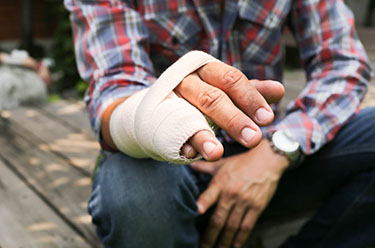
A catastrophic injury changes the dynamics of your life.
You are facing challenges on every front: physically, emotionally, and financially.
We understand that a catastrophic injury is one of life's most stressful events.
Fear comes into play as well if the person responsible for your injury is not providing compensation and assistance.
The California legal system seeks to compensate individuals who sustain catastrophic injury at the hands of another.
You deserve compassion, restitution, and justice. Starpoint LC Attorneys at Law commits to helping you navigate this process.
You are not alone; we are here to help.
What Is a Catastrophic Injury?
California law states that a catastrophic injury means consequences of an injury that permanently prevent an individual from performing any gainful work.
Examples of catastrophic injuries, within the medical context, provide a better understanding.
The following injuries are generally catastrophic in nature:
- Spinal cord injuries,
- Traumatic brain injuries,
- Burn injuries,
- Loss of limb,
- Multiple bone fractures, and
- Severe burns.
The above is just an illustrative list.
The common denominator is that catastrophic injuries are always severe.
There is also collateral damage to the injured person's dependants and spouse, as their loved one may never truly recover from the catastrophic injury.
Catastrophic Injuries vs. Other Personal Injuries
Do not confuse catastrophic cases with average personal injury cases.
In both types, a person suffers an injury at the hands of another.
However, the comparison ends there.
In catastrophic cases, the damage leads to extraordinary and ongoing medical care and rehabilitation.
The devastation is well beyond that of other types of personal injuries.
Permanent disability, long-term physical disability, psychiatric issues related to post-traumatic stress and anxiety, financial ruin, and life-altering career restrictions all are possibilities with catastrophic injuries.
Generally, however, these extremes are not part of most other personal injury cases.
What Are Common Causes of Catastrophic Injuries?
There are many potential causes of catastrophic injuries. Some of the more common causes are:
- Car and truck accidents,
- Work-related accidents,
- Medical malpractice,
- Falls,
- Sports and bicycle accidents, and
- Faulty equipment.
Lawyers who specialize in catastrophic injuries can evaluate any situation and determine whether it involves a catastrophic injury.
Our firm will investigate the cause of the injury.
We provide a thorough analysis of all aspects of your case.
Who Will an Attorney Sue In a Catastrophic Case?
Catastrophic injury cases generally fall under the legal umbrella of negligence law. Negligence occurs when someone suffers an injury as a direct result of someone else’s careless actions. An individual (adult or child) or business can cause the injury. If a domestic pet is the cause of the injury, the pet owner or caretaker is responsible.
A negligent act can give rise to a catastrophic injury lawsuit when these things occur:
- Someone has a duty to act with care in doing something;
- They breach their duty by not using the level of care ordinarily expected; and
- They cause a catastrophic injury to another person because they did not do what they were supposed to.
In these situations, the injured party can sue the negligent person. These cases are heartbreaking to all involved. Our goal is to handle the matter with care while doing everything possible to get you the compensation you deserve.
Settlements for Catastrophic Injuries
In the case of a catastrophic injury, there is often a settlement between the injured person and the person who caused the injury. The defendant or their insurance company will offer to pay the injured party a set sum of money to avoid going to court. You should always have an attorney review these offers before you accept or decline them.
What Should I Do If I or Someone I Love Has Experienced a Catastrophic Injury?
If you or someone you love has experienced a catastrophic injury, we want you to first know that we care. In this surely overwhelming period in life, it can be difficult to piece together the legal steps you should take. Here is what we recommend:
- Tend first and foremost to your immediate medical well being;
- Contact an attorney experienced in catastrophic injury cases;
- Keep all bills, receipts, and estimates of any medical costs;
- Keep records regarding any loss of income;
- Do not agree to anything with the person who caused the injury or any of their representatives before consulting with an attorney;
- Do not give any statement about your injury to anyone other than your lawyer;
- In your first meeting with your attorney, bring documents mentioned above; and
- If you need assistance with reading forms or relaying information, or want moral support, feel free to bring in a member of your support system (such as a spouse, friend, caretaker, etc.) to the meeting with your lawyer.
Your attorney will represent you and take the lead in handling your case. They will help you seek the compensation you deserve for your catastrophic injury caused by the negligence of another.
Ready to Speak with an Attorney? Contact Starpoint LC, Attorneys at Law
The experienced catastrophic injury lawyers at Starpoint Law are ready to listen. When you reach out to our team, you’ll get personal service. Not only will we aggressively fight for you, but we’ll also keep you informed so you’re not wondering what’s next. We want you to focus on your recovery and other needs while we address your legal concerns. After a severe accident or injury, turn to us.
Please visit our website to access our chat service, or fill out our online contract form, and we will be in touch with you shortly. In the greater Los Angeles area, Starpoint Law offers you experienced representation for every type of personal and catastrophic injury case.
